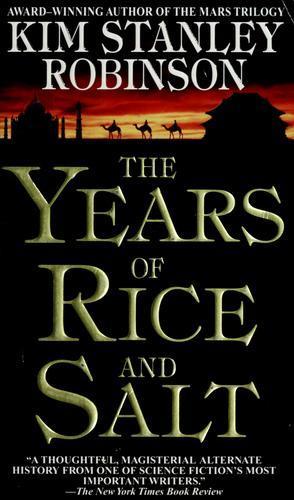784 pages
English language
Published July 29, 2003

784 pages
English language
Published July 29, 2003
The Years of Rice and Salt is an alternate history novel by American science fiction author Kim Stanley Robinson, published in 2002. The novel explores how world history might have been different if the Black Death plague had killed 99 percent of Europe's population, instead of a third as it did in reality. Divided into ten parts, the story spans hundreds of years, from the army of the Muslim conqueror Timur to the 21st century, with Europe being re-populated by Muslim pioneers, the indigenous peoples of the Americas forming a league to resist Chinese and Muslim invaders, and a 67-year-long world war being fought primarily between Muslim states and the Chinese and their allies. While the ten parts take place in different times and places, they are connected by a group of characters that are reincarnated into each time but are identified to the reader by the first letter of …
The Years of Rice and Salt is an alternate history novel by American science fiction author Kim Stanley Robinson, published in 2002. The novel explores how world history might have been different if the Black Death plague had killed 99 percent of Europe's population, instead of a third as it did in reality. Divided into ten parts, the story spans hundreds of years, from the army of the Muslim conqueror Timur to the 21st century, with Europe being re-populated by Muslim pioneers, the indigenous peoples of the Americas forming a league to resist Chinese and Muslim invaders, and a 67-year-long world war being fought primarily between Muslim states and the Chinese and their allies. While the ten parts take place in different times and places, they are connected by a group of characters that are reincarnated into each time but are identified to the reader by the first letter of their name being consistent in each life. The novel explores themes of history, religion, and social movements. The historical narrative is guided more by social history than political or military history. Critics found the book to be rich in detail, realistic, and thoughtful. The Years of Rice and Salt won the Locus Award for Best Science Fiction Novel in 2003. In the same year it was nominated for the Arthur C. Clarke Award, a Hugo Award, and a British Science Fiction Award.